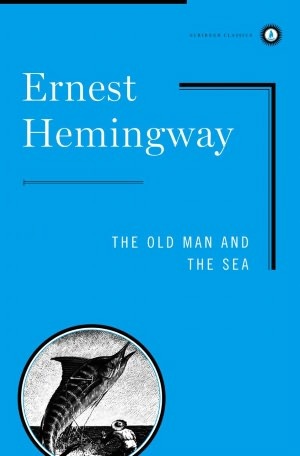Review: Ernest Hemingway’s “The Old Man and the Sea”
by Miles Raymer
It’s been a long time since I read anything by Ernest Hemingway, and even longer since I first read The Old Man and the Sea in my teens. This time around, the book proved both more and less impressive than I remember. Hemingway’s prose, although clean and efficient, rings somewhat hollow for me now. I think this was always true, but I wouldn’t have admitted it as a young literati who felt obligated to revere Hemingway due to his position in the American canon. But even if the language left me wanting, the existential depth of this novel came through loud and clear in a way I didn’t recognize years ago.
The Old Man and the Sea is a simple tale. Santiago, our “old man,” is an aged fisherman daunted by a spell of bad luck–– “eighty-four days now without taking a fish” (13). Though befriended by a youngster known only as “the boy,” Santiago is a solitary person with a worldview that doesn’t cast a net much farther than the next catch or baseball game results. His intense focus and persistence make him a formidable character and a winning protagonist.
Santiago’s story unfolds over the course of a single fishing expedition. Before leaving, he refuses the boy’s company, striking out on his own with only his determination as companion. As he makes his way into the ocean, his observations vary from stoic to impassioned. He expresses affection for some sea creatures by calling them “brothers,” and seems to revile others, at one point referring to a man-of-war as a “whore” (32). These hostile streaks in Santiago’s consciousness, combined with a vaguely racist reminiscence of beating a “negro” at arm wrestling earlier in life, make The Old Man and the Sea feel dated in some parts (55-6). However, the novel’s timeless message is ultimately strong enough to overshadow these anachronistic elements.
At its core, this is a narrative of negotiation with two basic layers: Santiago’s negotiation with the ocean itself, as personified by a giant marlin, and his negotiation with his own weathered but resilient body. The fish, which promises to break his streak of bad luck should he succeed in besting it, pushes Santiago to his physical and mental limits. For a long time it seems that their wills are equally matched, with Santiago holding on as the marlin steadily drags his skiff farther and farther out to sea: “I can do nothing with him and he can do nothing with me” (41).
Santiago understands this battle as both an indication of his superiority as a fisherman, but also a humbling reminder of humanity’s place in the greater cosmos:
He lay against the worn wood of the bow and rested all that he could. The first stars were out…and he knew soon they would all be out and he would have all his distant friends. “The fish is my friend too,” he said aloud. “I have never seen or heard of such a fish. But I must kill him.”…I do not understand these things, he thought. But it is good that we do not have to kill the sun or the moon or the stars. It is enough to live on the sea and kill our true brothers. (59-60)
This feeling of being in place, right where one belongs, covers this novel like a warm blanket. Santiago’s archetypal greatness comes from his equanimity, which holds steady even through great pain. His desire to outlast the fish––and the ocean itself––is tempered by his understanding that he is subject to the rules of a grand pageant over which he has no control.
Santiago also bargains fiercely with his own flesh. His body is the enabling factor in his struggle and also his greatest obstacle:
He felt faint again now but he held on the great fish all the strain that he could. I moved him, he thought. Maybe this time I can get him over. Pull, hands, he thought. Hold up, legs. Last for me, head. Last for me. (69)
As any expert laborer must be, Santiago is intimately in touch with the needs of his body, and makes great efforts to keep his strength up during the battle with the fish. Repeatedly he honors the capacities of his physique while lamenting its limitations:
He could feel the steady hard pull of the line and his left hand was cramped. It drew up tight on the heavy cord and he looked at it in disgust. “What kind of a hand is that,” he said. “Cramp then if you want. Make yourself into a claw. It will do you no good.” (48)
As the novel closes, Hemingway reminds us that nature––unwilling to sacrifice a single sardine for the toils of humanity––is not a fair negotiator. In this era of climate change, the lesson is deeply necessary and stings with a special cruelty. But Santiago, reunited finally with the boy on shore, indicates that he is not vanquished, and perhaps cannot be. Better still, he accepts the boy’s offer to take to the sea together once more, showing that he has opened himself again to the boons of brotherly cooperation. Triumph awaits, perhaps, with the next fish, but the dignity of hard work is everlasting.
Rating: 7/10
